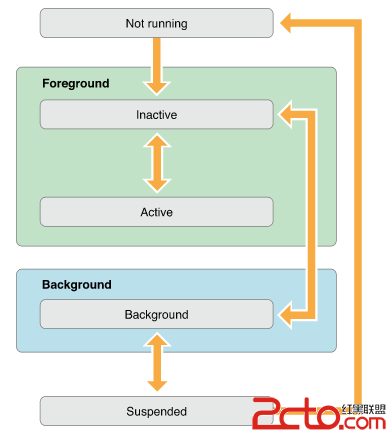ios 開發中的多線程
iOS中使用多線程的原因:
1,iOS中只有主線程有直接修改Ui的權利
2,iPhone中主線程堆棧1M,新開辟的線程堆棧512K
3,多任務,多核,效率,用戶體驗共同決定
(一)GCD(Grand Central dispatch)block和dispatch,可以簡化多核多線程編程,iOS4以後支持
1,block的定義類似於函數指針;block對象(塊對象);
可以存在block數組;
但block存儲在函數棧中,注意大括號中的生命周期;
2,block典型用法,圖片下載應用中的塊應用,嵌套異步block塊的使用,如果前面ok,則去UI更新
dispatch_async(dispatch_queue_create("com.enormego.EGOImageLoader",NULL), ^{
UIImage* image = styler(anImage);
[[EGOCache currentCache] setImage:image forKey:keyForURL(aURL, style) withTimeoutInterval:604800];
dispatch_async(dispatch_get_main_queue(), ^{
completion(image, aURL, nil);
});
});
(二)NSOperation和NSOpertionQueue
1,一個繼承自NSOperation的操作類,該類的實現中必須有 (void) main()方法
2,最簡單的方法,將NSOperation的實例放入NSOpertionQueue中
3,可以在NSOpertionQueue中設置同時可以進行的操作數
(三)NSThread
1,detachNewThreadSelector此為簡便方法,不用進行線程清理
[NSThread detachNewThreadSelector:@selector(myThreadMainMethod:) toTarget:self withObject:nil];
2,NSThread initialWithTarget, (void)start;方法,可以創建線程,但選擇合適的時機啟動線程
NSThread* myThread = [[NSThread alloc] initWithTarget:self
selector:@selector(myThreadMainMethod:)
object:nil];
[myThread start];
(四)線程間同步
1,原子鎖屬性,automic,noautomic,變量可以保證多線程訪問
2,NSCondition,可以提供帶條件的同步鎖,解鎖時,需要輸入相同的條件才能解鎖
3,NSLock, lock,unlock比較簡單的同步鎖
4,@synchronized(anObject)更簡單的所方式,通常用在單例對象的創建上面
- 上一頁:iOS 基本內存管理
- 下一頁:iOSUI控件常見屬性總結




